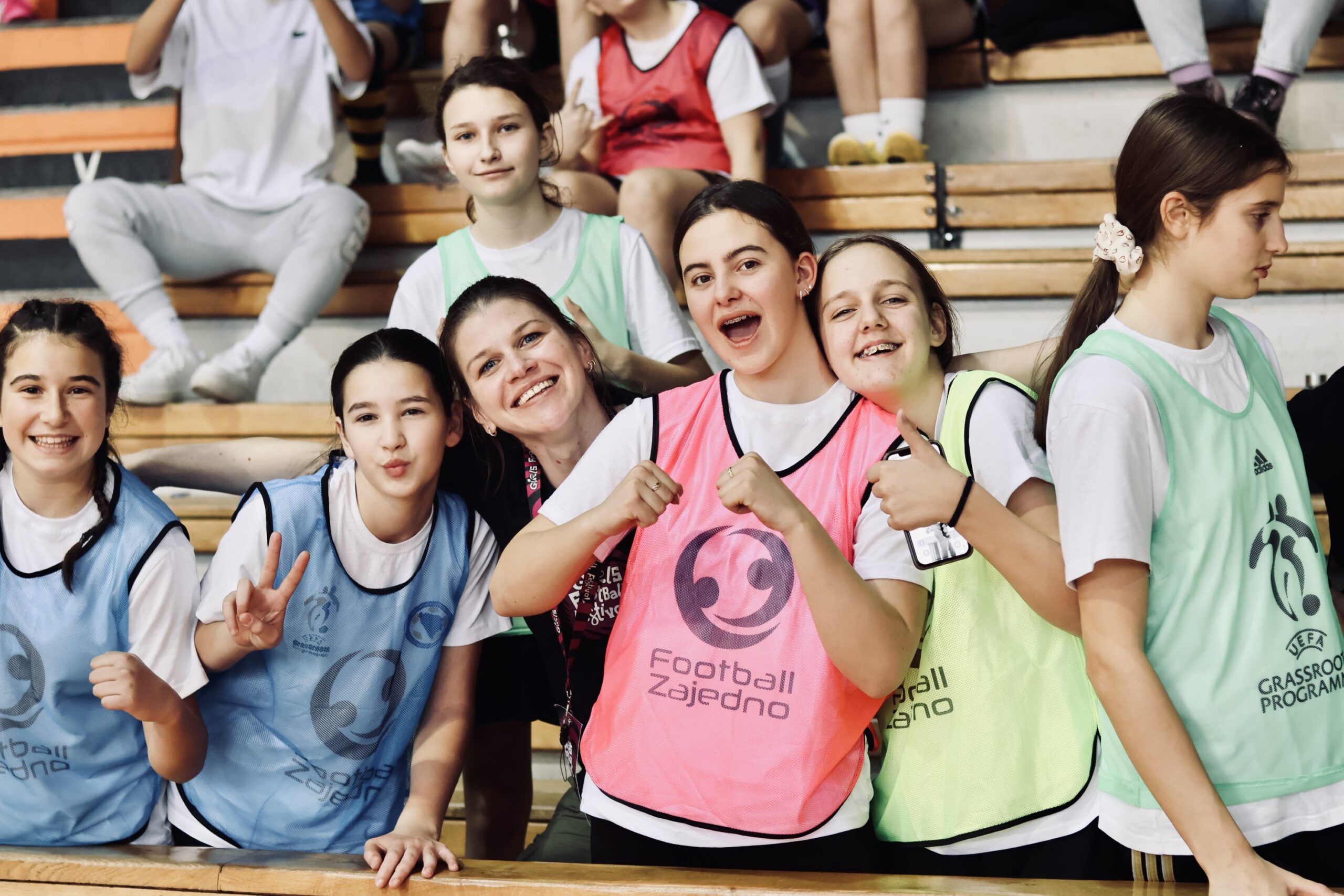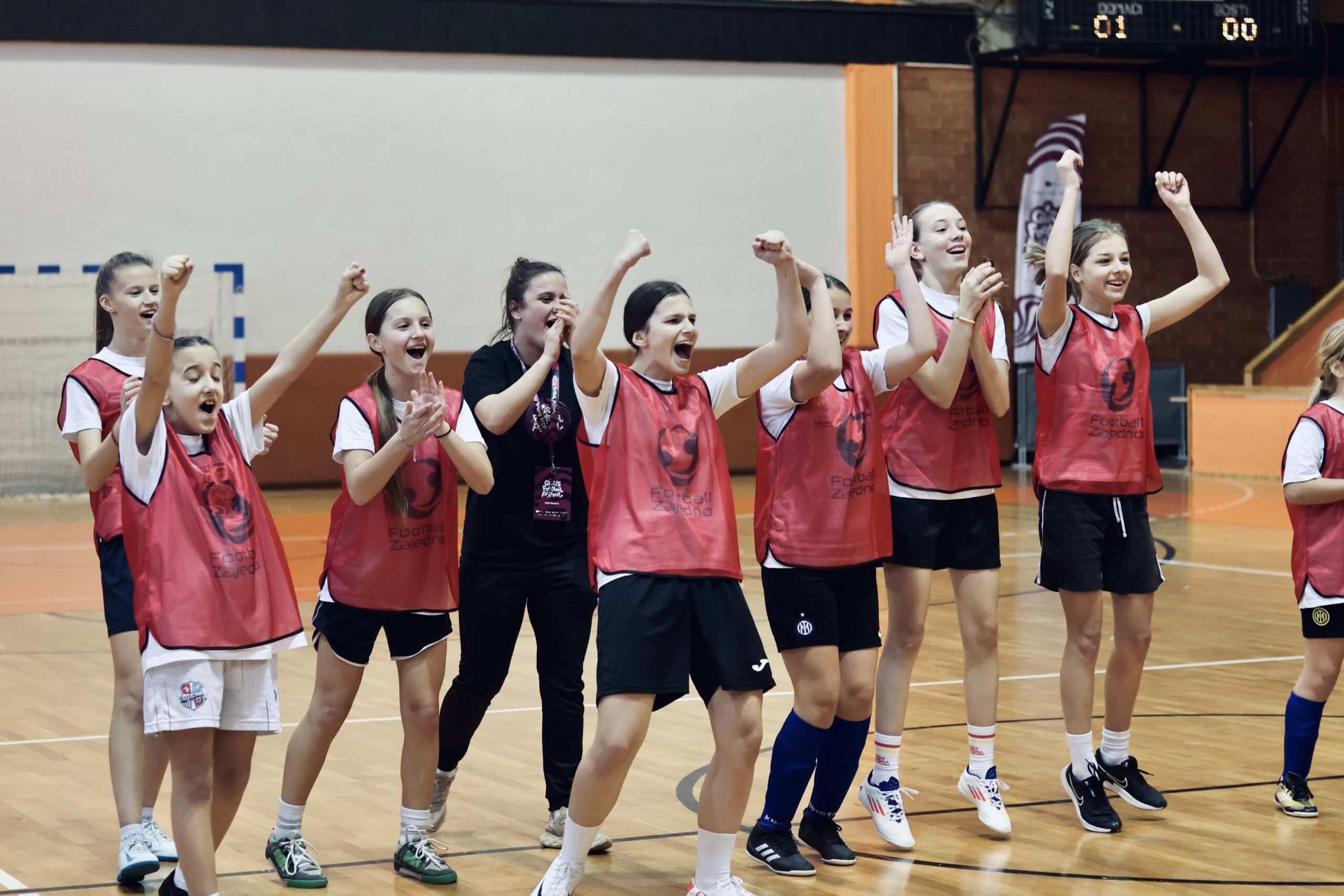
“After participating in the Girls Football Festival, I have newfound enthusiasm and a completely different perspective on my sporting future. The moments we enjoyed the most were when we played together, regardless of where we came from—we demonstrated the power of teamwork, support, and perseverance,” says Dalila Komarica from Sarajevo, a coach at the Women’s Football Club “Respekt.” She emphasizes that “this festival is not a celebration of victory, but of enjoyment on and off the field”.
“Respekt” was one of nine clubs that participated in the Girls Football Festival from January 24 to 26, 2025. The festival, held in Sarajevo, was organized by the Play Together Initiative (https://izi.ba/) and was hosted in Bosnia and Herzegovina for the first time after several years of being held in Vienna, in collaboration with the FairPlay Initiative, which operates under the Institute for International Cooperation and Development in Vienna.
“The festival provided us with invaluable lessons. We learned that victory is not just about results but about the process of learning, working, and growing. It highlighted the importance of an encouraging environment and a positive atmosphere. The GFF undoubtedly has a far-reaching impact on the development of young athletes and their coaches—by working in mixed teams, we had the opportunity to meet new friends, learn new skills, and exchange methodologies to expand our knowledge of coaching and team leadership,” says Dalila.
Edita Čavrk, a student at a medical high school in Sarajevo, is a member of the Women’s Football Club “Respekt.”
“Every girl at the festival tried something new, relaxed, and stepped out of her comfort zone. We had workshops that gave us insight into how unique each of us is and how we all contribute to our community in our own way—we matter. But the most beautiful part was excelling on the field, blending different playing styles, and creating something special. I feel that my confidence has grown; I can now realistically assess and appreciate my abilities, and I hope to apply everything I’ve learned to continue developing both as a person and as an athlete,” Edita tells WeBalkans. She emphasizes that she can’t wait for the next festival.
A member of the organizing team, Mirna Hrapović from the Play Together Initiative, explains that in previous years, teams from across the Western Balkans—Bosnia and Herzegovina, Serbia, Montenegro, Croatia, and Kosovo—participated in the festival, and they hope to continue this tradition. This year, Sarajevo hosted nine teams from Bosnia and Herzegovina (Zenica, Orašje, Gornji Vakuf, Pale) and Montenegro (Bijelo Polje, Berane, and Podgorica), with 150 participants, most of whom were female athletes aged 13 to 15.
“Experience shows that this age group is ideal to work with because they are at a crossroads in life, considering their future in sports, but mature enough to understand the concepts we communicate through accompanying workshops on human rights, discrimination, gender equality, mental health, and more,” says Hrapović. She stresses that IZI strives to ensure that everything they do has a broader impact and sees sports as a tool for social transformation.
“The idea is for participants to meet, break down prejudices, and overcome questions like whether football is a game for girls. Year after year, we see that while they may be reserved at first, after the initial activities, they play as if they have known each other their whole lives,” says Hrapović, noting that some girls have even gone on to play for their national teams after participating in previous festivals.

The GFF also welcomed a team from the Berane Academy in Montenegro, where the women’s team has been active for just six months. In Sarajevo, 11 girls aged 12 to 14 played.
“The atmosphere was phenomenal, and it’s impossible to say what the girls enjoyed most, but I would highlight the tournament’s structure, where all clubs were mixed, creating new teams and fostering new friendships. This festival helps girls realize their importance, understand that football offers a lot, and recognize that the future of women’s football in Montenegro and Bosnia and Herzegovina depends on them. With these young players, the future of our regional football is secure. The GFF also aids in socialization by offering important activities beyond the game, creating unforgettable memories,” says Aleksandar Raković, coach at Berane Academy. The club hopes that the next festival will be hosted in Montenegro and looks forward to welcoming their Bosnian friends in return.
The European Union explains that it is committed to gender equality in all aspects of life, including sports.
“Women’s football is becoming increasingly popular, but there are still barriers for girls and women in football, especially compared to men’s football. However, the EU funds many initiatives supporting increased female participation in sports, including the #BeInclusive EU Sports Awards, the HealthyLifestyle4All initiative, and the Erasmus+ Sport program. We are proud to have funded the first Girls Football Festival in Bosnia and Herzegovina because this initiative promotes equal opportunities, breaks stereotypes, and helps young women access sports on the same level as men. By giving girls more opportunities to play, learn, and connect, we support inclusivity and equal access. In the long run, this initiative aims to increase the visibility of women in football and helps building local networks that support female athletes,” says Ferdinand Koenig from the EU Delegation to BiH.
Judging by the festival and other ongoing efforts, the future of women’s sports looks promising—the Olympic Committee of Bosnia and Herzegovina has awarded a Team Support Grant of $100,000 to the Bosnia and Herzegovina Women’s Basketball National Team, with the next grant set to go to the Women’s Rugby National Team. Meanwhile, IZI announces that they will continue supporting the establishment of new women’s football clubs.
“The festival provided us with invaluable lessons. We learned that victory is not just about results but about the process of learning, working, and growing. It highlighted the importance of an encouraging environment and a positive atmosphere. The GFF undoubtedly has a far-reaching impact on the development of young athletes and their coaches—by working in mixed teams, we had the opportunity to meet new friends, learn new skills, and exchange methodologies to expand our knowledge of coaching and team leadership,” says Dalila.
Edita Čavrk, a student at a medical high school in Sarajevo, is a member of the Women’s Football Club “Respekt.”
“Every girl at the festival tried something new, relaxed, and stepped out of her comfort zone. We had workshops that gave us insight into how unique each of us is and how we all contribute to our community in our own way—we matter. But the most beautiful part was excelling on the field, blending different playing styles, and creating something special. I feel that my confidence has grown; I can now realistically assess and appreciate my abilities, and I hope to apply everything I’ve learned to continue developing both as a person and as an athlete,” Edita tells WeBalkans. She emphasizes that she can’t wait for the next festival.
A member of the organizing team, Mirna Hrapović from the Play Together Initiative, explains that in previous years, teams from across the Western Balkans—Bosnia and Herzegovina, Serbia, Montenegro, Croatia, and Kosovo—participated in the festival, and they hope to continue this tradition. This year, Sarajevo hosted nine teams from Bosnia and Herzegovina (Zenica, Orašje, Gornji Vakuf, Pale) and Montenegro (Bijelo Polje, Berane, and Podgorica), with 150 participants, most of whom were female athletes aged 13 to 15.
“Experience shows that this age group is ideal to work with because they are at a crossroads in life, considering their future in sports, but mature enough to understand the concepts we communicate through accompanying workshops on human rights, discrimination, gender equality, mental health, and more,” says Hrapović. She stresses that IZI strives to ensure that everything they do has a broader impact and sees sports as a tool for social transformation.
“The idea is for participants to meet, break down prejudices, and overcome questions like whether football is a game for girls. Year after year, we see that while they may be reserved at first, after the initial activities, they play as if they have known each other their whole lives,” says Hrapović, noting that some girls have even gone on to play for their national teams after participating in previous festivals.

The GFF also welcomed a team from the Berane Academy in Montenegro, where the women’s team has been active for just six months. In Sarajevo, 11 girls aged 12 to 14 played.
“The atmosphere was phenomenal, and it’s impossible to say what the girls enjoyed most, but I would highlight the tournament’s structure, where all clubs were mixed, creating new teams and fostering new friendships. This festival helps girls realize their importance, understand that football offers a lot, and recognize that the future of women’s football in Montenegro and Bosnia and Herzegovina depends on them. With these young players, the future of our regional football is secure. The GFF also aids in socialization by offering important activities beyond the game, creating unforgettable memories,” says Aleksandar Raković, coach at Berane Academy. The club hopes that the next festival will be hosted in Montenegro and looks forward to welcoming their Bosnian friends in return.
The European Union explains that it is committed to gender equality in all aspects of life, including sports.
“Women’s football is becoming increasingly popular, but there are still barriers for girls and women in football, especially compared to men’s football. However, the EU funds many initiatives supporting increased female participation in sports, including the #BeInclusive EU Sports Awards, the HealthyLifestyle4All initiative, and the Erasmus+ Sport program. We are proud to have funded the first Girls Football Festival in Bosnia and Herzegovina because this initiative promotes equal opportunities, breaks stereotypes, and helps young women access sports on the same level as men. By giving girls more opportunities to play, learn, and connect, we support inclusivity and equal access. In the long run, this initiative aims to increase the visibility of women in football and helps building local networks that support female athletes,” says Ferdinand Koenig from the EU Delegation to BiH.
Judging by the festival and other ongoing efforts, the future of women’s sports looks promising—the Olympic Committee of Bosnia and Herzegovina has awarded a Team Support Grant of $100,000 to the Bosnia and Herzegovina Women’s Basketball National Team, with the next grant set to go to the Women’s Rugby National Team. Meanwhile, IZI announces that they will continue supporting the establishment of new women’s football clubs.
Please wait while your video is being uploaded...
Don't close this window!